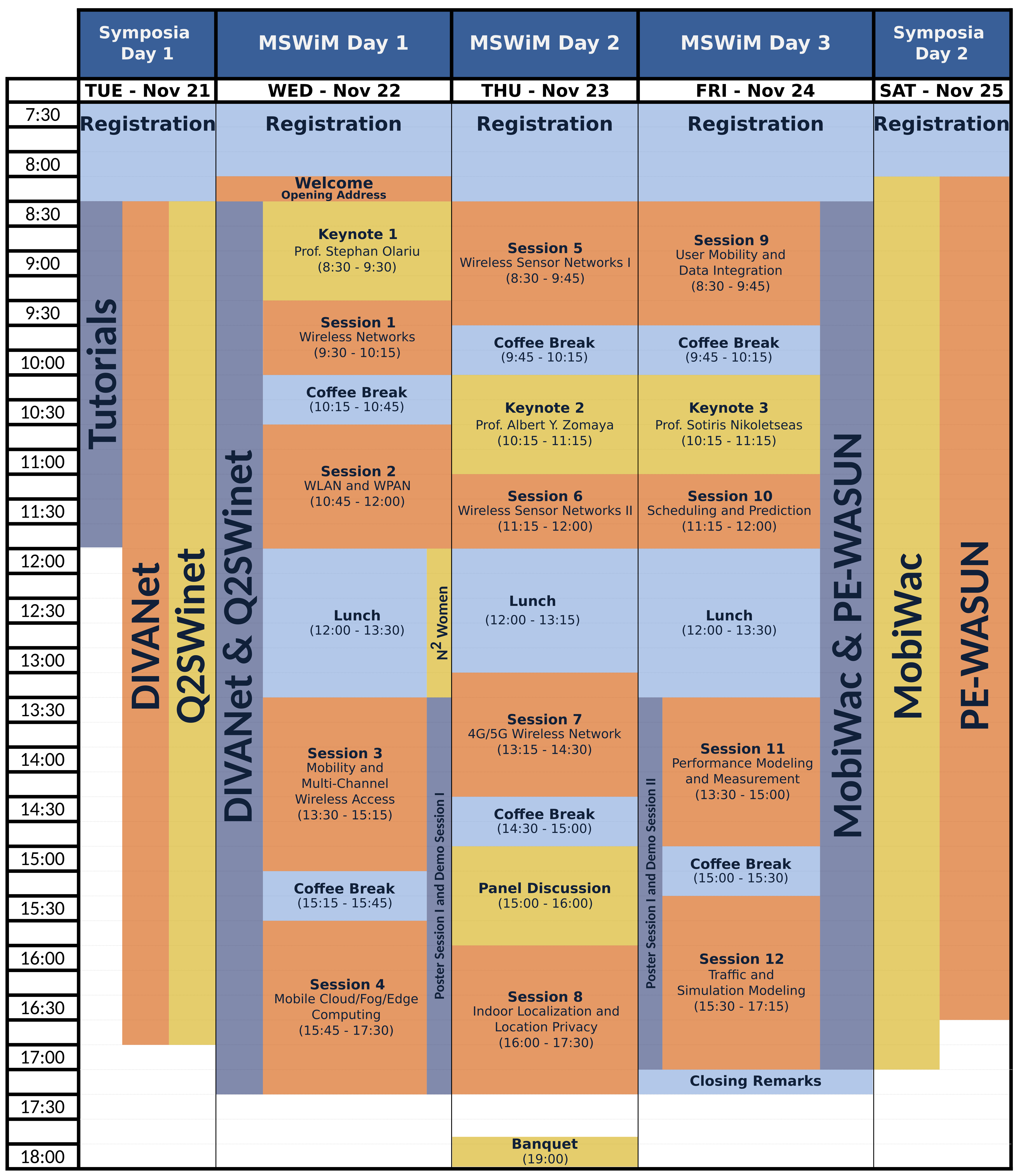Tentative Technical Program
Program at a glance (click on the image to get to the event description, or scroll the page)

| Black = full paper (25-min oral presentation) / Red = short paper (15-min oral presentation) |
Tuesday, November 21
7:30
Registration Opening
All Day
Concurrent Symposia I
9:30 - 12:30
Tutorial I
- Big data analytics of mobile things
12:30 - 13:30
Lunch Break
13:30 - 16:00
Tutorial II
- Opportunistic Routing in Underwater Sensor Networks: Potentials, Challenges and Guidelines
Wednesday, November 22
7:30
Registration Opening
All Day
Concurrent Symposia II
8:00 - 8:30
Welcome Address
8:30 - 9:30
Keynote Speech 1
- VC Research - What is Missing?
9:30 - 10:15
Session 1: Wireless Networks
- Optimal Mapping of Stations to Access Points in Enterprise Wireless Local Area Networks
- Semi-Blind Interference Prediction in Wireless Networks
10:15 - 10:45
Coffee Break
10:45 - 12:00
Session 2: WLAN and WPAN
- LABeL: Link-based Adaptive BLacklisting Technique for 6TiSCH Wireless Industrial Networks
- WiFO: A Hybrid WiFi Free-Space Optical Communication Networks of Femtocells
- The Importance of Adjacent Channel Interference: Experimental Validation of ns-3 for Dense Wi-Fi Networks
12:00 - 13:30
Lunch Break
12:00 - 13:30
N2 Women Panel
13:30 - 17:30
Poster Session and Demos I
13:30 - 15:15
Session 3: Mobility and Multi-Channel Wireless Access
- Carrier-Sense Multiple Access with Collision Avoidance and Detection
- Multi-Channel Continuous Rendezvous in Cognitive Networks
- Rendezvous with Utilities in Cognitive Radio Networks
- Improving BLE Distance Estimation and Classification using TX power and Machine Learning: A Comparative Analysis
- GRM: Group Regularity Mobility Model
15:15 - 15:45
Coffee Break
15:45 - 17:30
Session 4: Mobile Cloud/Fog/Edge Computing
- Quality of Experience-Aware Mobile Edge Caching through a Vehicular Cloud
- Cost-Effective Processing in Fog-Integrated Internet of Things Ecosystems
- QoS-Aware Task Offloading in Distributed Cloudlets with Virtual Network Function Services
- Providing Computing Services through Mobile Devices in a collaborative way - A Fog Computing Case Study
- Hardening Opportunistic HIP
Thursday, November 23
7:30
Registration Opening
8:30 - 9:45
Session 5: Wireless Sensor Networks I
- DADCA: An Efficient Distributed Algorithm for Aerial DataCollection from Wireless Sensors Networks by UAVs
- Experimental Study of Packet Loss in a UWB Sensor Network for Aircraft
- Lifetime-Aware Data Collection Using A Mobile Sink in WSNs with Unreachable Regions
9:45 - 10:15
Coffee Break
10:15 - 11:15
Keynote Speech 2
- Provisioning and Management of Internet of Things Applications: Open Issues and Insights
10:15 - 12:00
Session 6: Wireless Sensor Networks II
- Serial in-network Processing for Large Stationary Wireless Sensor Networks
- PTQ: A New Privacy-Preserving Top-|k| Query Protocol in Tiered Wireless Sensor Networks
12:00 - 13:15
Lunch Break
13:15 - 14:30
Session 7: 4G/5G Wireless Network
- Live Synthesis of Vehicle-Sourced Data Over 4G LTE
- Performance Model for 4G/5G Heterogeneous Networks with Different Classes of Users
- Joint User Association and Backhaul Routing for Green 5G Mesh MillimeterWave Backhaul Networks
14:30 - 15:00
Coffee Break
15:00 - 16:00
Panel Discussion
16:00 - 17:30
Session 8: Indoor Localization and Location Privacy
- Acrux: Indoor Localization Without Strings
- Pre-Crowdsourcing: Predicting Wireless Propagation withPhone-Based Channel Quality Measurements
- Rate-Compatible Transmission Schemes Based on Parallel Concatenated Punctured Polar Codes
- An Uncertain Continuous Collaborative Users Finding Algorithm for Location Privacy Protection
Friday, November 24
7:30
Registration Opening
All Day
Concurrent Symposia III
8:30 - 9:45
Session 9: User Mobility and Data Integration
- Reverse Engineering Human Mobility in Large-scale Natural Disasters
- SMAFramework: Urban data integration framework for mobility analysis in smart cities
- Inferring Private Demographics of New Users in Recommender Systems
9:45 - 10:15
Coffee Break
10:15 - 11:15
Keynote Speech 3
- Key Concepts and Algorithms for Wireless Power Transfer in Adhoc Communication Networks
11:15 - 12:00
Session 10: Scheduling and Prediction
- Scheduling Nodes in Underwater Networks using Voronoi Diagram
- Energy-efficient HTTP Adaptive Streaming with Anticipated Channel Throughput Prediction in Wireless Networks
12:00 - 13:30
Lunch Break
13:30 - 17:30
Poster Session and Demos II
13:30 - 15:00
Session 11: Performance Modeling and Measurement
- GeoRIPE: Efficiently Harvesting Field Measurements for Map-Based Path Loss Modeling
- INDIGO: Interest-Driven Data Dissemination Framework For Mobile Networks
- Synchronizing Tiny Sensors with SISP: a Convergence Study
- REPSYS: A Robust and Distributed Reputation System for Delay-Tolerant Networks
15:00 - 15:30
Coffee Break
15:30 - 17:15
Session 12: Traffic and Simulation Modeling
- Cross Fertilization Between Wireless Testbeds and NS-3 Simulation Models
- Tracking You through DNS Traffic: Linking User Sessions by Clustering with Dirichlet Mixture Model
- CESAR: A Testbed Infrastructure to Evaluate the Efficiency of Wireless Automotive Software Updates
- Ensuring the Reliability of an Autonomous Vehicle: a Formal Approach based on Component Interaction Protocols
- Attraction-Area based Geo-Clustering for LTE Vehicular CrowdSensing Data Offloading